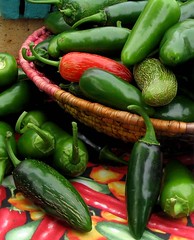Now I'm just getting mad...
After being almost done with my second loving pass through Animal, Vegetable, Miracle (one of only a handful of books I've ever read twice, and the only one I immediately started over after finishing it), I'm working on a new book: "The Omnivore's Dilemma: A Natural History of Four Meals" by Michael Pollan.
If "AVM" inspired me, "Omnivore's Dilemma" is pissing me off and scaring me. We have become truly stupid about our food, people. Our ignorance is horrifying. I will write more about this book later, but, suffice it to say, it is continuing to drastically refine my thoughts about what I purchase and put on my table and into my mouth. Every page brings a tidbit that stuns me.
For example:
So, yeah, this one is pissing me off. And horrifying me. And calling me to even greater action with regard to my food. After finishing the "Grass" chapter, however, I have to give mad props to Polyface Farms out of Virginia. These people truly "get it." I dare anyone to read that chapter and not have a Eureka moment. It just makes sense.
I'll write more about this book later. The gist is, if you're ready to have your world rocked and begin to drastically rethink how you shop and eat, read this book. If you'd rather stay ignorant, don't.
If "AVM" inspired me, "Omnivore's Dilemma" is pissing me off and scaring me. We have become truly stupid about our food, people. Our ignorance is horrifying. I will write more about this book later, but, suffice it to say, it is continuing to drastically refine my thoughts about what I purchase and put on my table and into my mouth. Every page brings a tidbit that stuns me.
For example:
- "Corn-fed beef" is nothing to be proud of. Cows were not designed to digest grain. They are ruminant grass-eaters, forced onto a wholly unnatural diet so big agribusiness can fatten them up quicker on cheap corn and get them to market. If they were not pre-emptively pumped full of antibiotics and other medicines, their rumens would become ulcerated and infected due to this imposed diet of corn. Not only are they eating unnaturally, but they live, crammed together with other cows, standing on three feet of their own manure. They can barely move. They do not live a life designed for a cow. When they are slaughtered, they may or may not be granted a quick death. The slaughterhouse doesn't stop the cutting just because a cow's not quite dead yet.
- If you eat industrially, meaning most foods to be found at the supermarket or a great majority of restaurants, you are shoveling in corn. Corn holds together a McNugget, it sweetens your soda pop, it fattens your meat. It is in your ketchup. It is in your mayonnaise. It is in your breakfast cereals. It is in your bread. We eat more "food" that is partially or completely corn-derived than we know. Crystalline fuctose, ascorbic acid, dextrose, lactic acid, lysine, HFCS (high-fructose corn syrup), xanthan gum, and modified or unmodified starch, are all derived from corn.
- Want to know why we're getting obese on this cheap food? One dollar buys you 875 calories' worth of soda pop, but only 170 calories of fruit juice. There's no economic incentive to buy healthy food.
- The current generation of children has a one-in-three chance of developing diabetes. They are also the first generation with a life expectancy shorter than their parents'.
- If the sixteen million acres now being used to grow corn to feed cows in the United States became well-managed pasture (to provide the cows with a natural diet), it would remove 14 billion pounds of carbon from the atmosphere each year, the equivalent of taking four million cars off the road.
- The ingredients in a standard meal you sit down to eat likely traveled at least 1500 miles to reach your plate. One-fifth of this country's oil consumption is for the production and transportation of food. Approximately 50 gallons of oil per acre are used in the production of corn. We might as well be drinking motor oil directly.
- "Organic" won't save you, either. Relying on the word "organic" on a supermarket package is a fool's privilege and means less and less on its own merits as the government slices and dices its meaning. "Organic" milk could be coming from a dry feedlot where 500 cows are crammed together, eating organic grain but never one blade of grass. It doesn't mean they're happy cows.
- If you buy a "free-range" chicken from someplace like Whole Foods, it doesn't mean that chicken ever ventured outdoors. Most major producers of free-range chickens raise the animals in huge football-field-sized barns and, though there's a door to an outside run, it's not opened until the animals are five weeks old, because the poultry producers are so afraid these inherently more disease-prone chickens will contract some germ or infection. Once the door to the outside is opened, the chickens will very rarely venture outside because they've never known the outside world and are afraid. Those chickens are killed at the age of seven weeks old. Michael Pollan calls it their "two-week vacation opportunity." So, "free-range" doesn't mean the chicken had a good life.
So, yeah, this one is pissing me off. And horrifying me. And calling me to even greater action with regard to my food. After finishing the "Grass" chapter, however, I have to give mad props to Polyface Farms out of Virginia. These people truly "get it." I dare anyone to read that chapter and not have a Eureka moment. It just makes sense.
I'll write more about this book later. The gist is, if you're ready to have your world rocked and begin to drastically rethink how you shop and eat, read this book. If you'd rather stay ignorant, don't.

